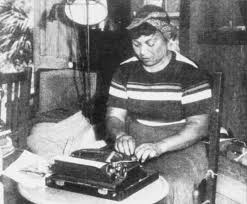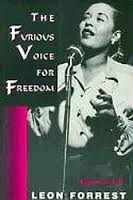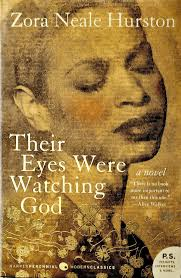
 As a Black male writer, one whose first three trilogic novels Toni Morrison edited, the late novelist Leon Forrest (Divine Days) finds a juncture towards a shared aesthetic—on the basis of thematic content and, to a certain degree, style—with the Black woman through the Black music of the Black church. Gospel music’s ubiquitous role in African-American cultural production is, at its heart, centered on the search for happiness and hope despite it all. This is a goal Black men and women are bonded by and can certainly agree on, in the face of having unique gendered challenges, and this is where Forrest is able to enter into a shared dialogue with his sister cultural carriers. With differing political positions and fractured domestic relations, Black men and women meet largely on the common ground of hope and survival, the common ground transcending identity and bonding them, beyond classifications, with the human race.
As a Black male writer, one whose first three trilogic novels Toni Morrison edited, the late novelist Leon Forrest (Divine Days) finds a juncture towards a shared aesthetic—on the basis of thematic content and, to a certain degree, style—with the Black woman through the Black music of the Black church. Gospel music’s ubiquitous role in African-American cultural production is, at its heart, centered on the search for happiness and hope despite it all. This is a goal Black men and women are bonded by and can certainly agree on, in the face of having unique gendered challenges, and this is where Forrest is able to enter into a shared dialogue with his sister cultural carriers. With differing political positions and fractured domestic relations, Black men and women meet largely on the common ground of hope and survival, the common ground transcending identity and bonding them, beyond classifications, with the human race.

In The Furious Voice for Freedom, Forrest considers exemplary Black female writers who have employed this formulation in Billie Holiday’s shadow, just like her imperfect and rusty voice ripped of the strait jacket of expression society imposed on Black women against their nascent gifts. Forrest acknowledged Toni Morrison as the leader of such significant writers as Gloria Naylor. But he leaves out mention of the one who was always left out: Zora Neale Hurston.
Like my personal introduction to Billie, my introduction to Zora was obscured in phantom representations passed along by women who applauded something other than the artist’s characteristic style—something deeper which was felt due to themes, ideas, situations and possibilities in the work. All this had to hit hardest at their hearts.
Unlike Booker T. Washington, W.E.B. DuBois, Langston Hughes, Richard Wright, Gwendolyn Brooks, Lorraine Hansberry, Nikki Giovanni, James Baldwin, Alice Walker, and Toni Morrison, Zora Neale Hurston was not a name mentioned in my schools, not even during Black History Month. My knowledge of her arrived only after I came across a tiny, early-edition paperback copy of Their Eyes Were Watching God in the break room at one of my teenage jobs. It was a book passed around by women I worked with in a small town’s Catholic hospital kitchen, a kitchen run and supervised by black women. I don’t remember the description on the back of the book, nor can I recall what image the cover held. However it was clear something had drawn someone to buy a book they would rather pass around than discard. No one had read the book in its entirety yet because it always came with an unfavorable review: “Aw…she caint write.”

The preferred books to delve into on work and lunch breaks were mass paperback, bestselling romances and true-crime novels scattered about: popular genres which spilled inside secrets of lily-white domestic spheres and scandalous life. While I finished after-school homework, these were the books women around me read. They were dramatic narratives about outsiders whose romances and horror stories were a version of our own but in different manifestations. Passion, heartbreak, disappointment, victimization, and the possibility of a happy ending were the hooks.
I soon gathered that all the ladies who had tried Their Eyes Were Watching God thought that Zora could not write because her work- just like Holiday’s voice-was not “perfect.” The conclusion Hurston could not write because they couldn’t understand the characters’ speech (characters who would actually sound closer to them than the characters in their preferred literature) explained the problem with her work as the inability to decipher a Hurston code of language which signaled sound.
Yet a version of the black language present in Hurston’s altered spellings carried out in the everyday in speech, and writing, of our reality. Announcements were pasted on the bulletin boards and written notices given with misspellings, standard grammatical errors. However, their messages were still interpretable (“If any one know where the key to the stockroom is…” or “We havin a meetin at 1,” for instance). Nobody ever said those writers could not write.
Hurston’s was not the King’s English we learned to read even though it was the one more closely spoken. A literary text devoted to and concerned with suggesting speech, resounding voices from their everyday realities and interior lives, was not welcome on their 15-minute smoke break from work in a busy, hot, crowded Midwest hospital kitchen. The possibility of reading what we had learned to be broken language- through interactions with the White world in public, work and school- was strange to do.
But even so, the text rooted in rich Black oral tradition propagated that tradition by not being read. Their Eyes Were Watching God may have never gone missing or been altogether discarded because it was an animating conversation piece. While the other books were read, passed along and quietly recommended, the one book that was never read was certainly the book most discussed.
Its legend was that it was about an “old woman” who is “going with” a young man. From that small teaser, the women would take it from there. Despite trouble with the look of the book’s speech, it was common practice for us to open the book up to its funnier passages of dialogue and conversation; a popular one was the description of Janie Starks’ first husband’s smelly feet. The exact details and developments of the story were not pursued by close reading as with the other books, however. What appeared appealing about the text was the sensationalism of its story and certain symmetrical details rarely found in the narratives of white realities.
There was no photograph of Ms. Hurston on the book. Yet just from the tidbits her “readers” most remembered of their perusals of the story—that she had had to shoot her young lover, who had been bitten by a mad dog and gone mad himself—her ability to recount this story would have guaranteed her a place at the table.
Like Holiday, Hurston had exhibited the ability to resonate thematically, not stylistically, with the audience, and not through belabored style but through resonant stories we could relate to from happenings and remembrances in our own lives. I remember one conversation about the book when a co-worker narrated how her ex-husband shot their 9-year old German shepherd in the back yard after suspicions he had gone rabid. This was the story she told, from which another picked up on a tangent.
Thus Their Eyes Were Watching God, moreso than the other books with their unfamiliar locales and depicted ways of being, incited a playful tit-for-tat. It had a way for working-class Black women to insert the details of their own realities into conversations of politics, victimization, atrocity and spectacle. The idea of a relationship they could playfully imagine and talk about, even if they could not decipher a depiction of what sound looked like for people who talked like them, did not necessitate direct experience with Zora’s version of her novel. What ignited our spirits about the work was the awesome imagining of the unrecognizable language it presented in the midst of drama we could recognize.

Kalisha,
Thank you for writing this! As a writer it always upsets me when I look back at my high school English studies being in honors lit classes and such the lack of black author representation especially Black women. We did read Toni Morrison’s Beloved and I found myself most in Zora Neale Hurston’s essay “How It Feels to be Colored Me.” That essay really opened my eyes. I’m hoping to read some of her novels some time in the near future.
LikeLiked by 1 person
Hello and you are so welcome. Yeah, we had it kind of bad back then. I am inspired by more and more black women who teach English in charter schools, urban areas, etc…who have bookshelves now in their classroom that I could have only dreamed of back then. Thank you for reading! Many Blessings, Kalisha
LikeLiked by 1 person
What a wonderful post. I love some of the authors you mentioned and Langston Hughes’s, complete book of poems is on the table, waiting to be read. Grew up reading Baldwin and many other of the authors you mentioned. Their words helped me become who I am. Again. outstanding post, enjoyed it so very much.
LikeLiked by 1 person
Thank you and please look forward to more on her this week! I am glad the powers that be finally got Zora into that Hughes and Baldwin mandatory bunch….Happy writing, Kalisha
LikeLike
I’m surprised you did not encounter Hurston in your studies–Their Eyes Were Watching God was one of the texts in a college course I took almost 20 years ago, and, more recently (last year), the author appeared on a list of historical black women to be researched for Black History Month (along with Oprah, and Michele Obama, and a few others. I was mostly disappointed that women were not better represented, but Hurston was there) in my daughter’s fifth grade class. Anyway, I was reminded of how much I loved the book when I saw her name on the list, and I read it aloud (skipping over the racier and more harrowing bits) to my two school age daughters over the summer. The dialect is difficult for the modern reader; reading Mark Twain presents the same problem. After a few pages, though, you get used to it, you get used to hearing these characters talk this way, so it becomes less of an obstacle. It’s a great book, very, very funny at times, poignant at others, and my daughters and I got into a lot of interesting conversations discussing the choices Janie Crawford makes.
LikeLiked by 2 people
Hello Karen,
I thought I said I was a teenager in small town America and Zora was not part of my high school’s scant focus on black writers, usually concentrated most in Black History Month, so I found her on my own through black women at work. Certainly by the time I got to college focusing on black and women’s lit, she came up pretty quickly. I am going to get into that part tomorrow.
I love the novel as well and it is one of the most hilarious ones from that time, so much happiness in middle of whatever pain she wrote through at all times. I do believe she belongs up there with the likes of Mark Twain, as a master of humor, but many obstacles exist to her being seen as such so thank God we celebrate her today. Many Blessings, Kalisha
LikeLike